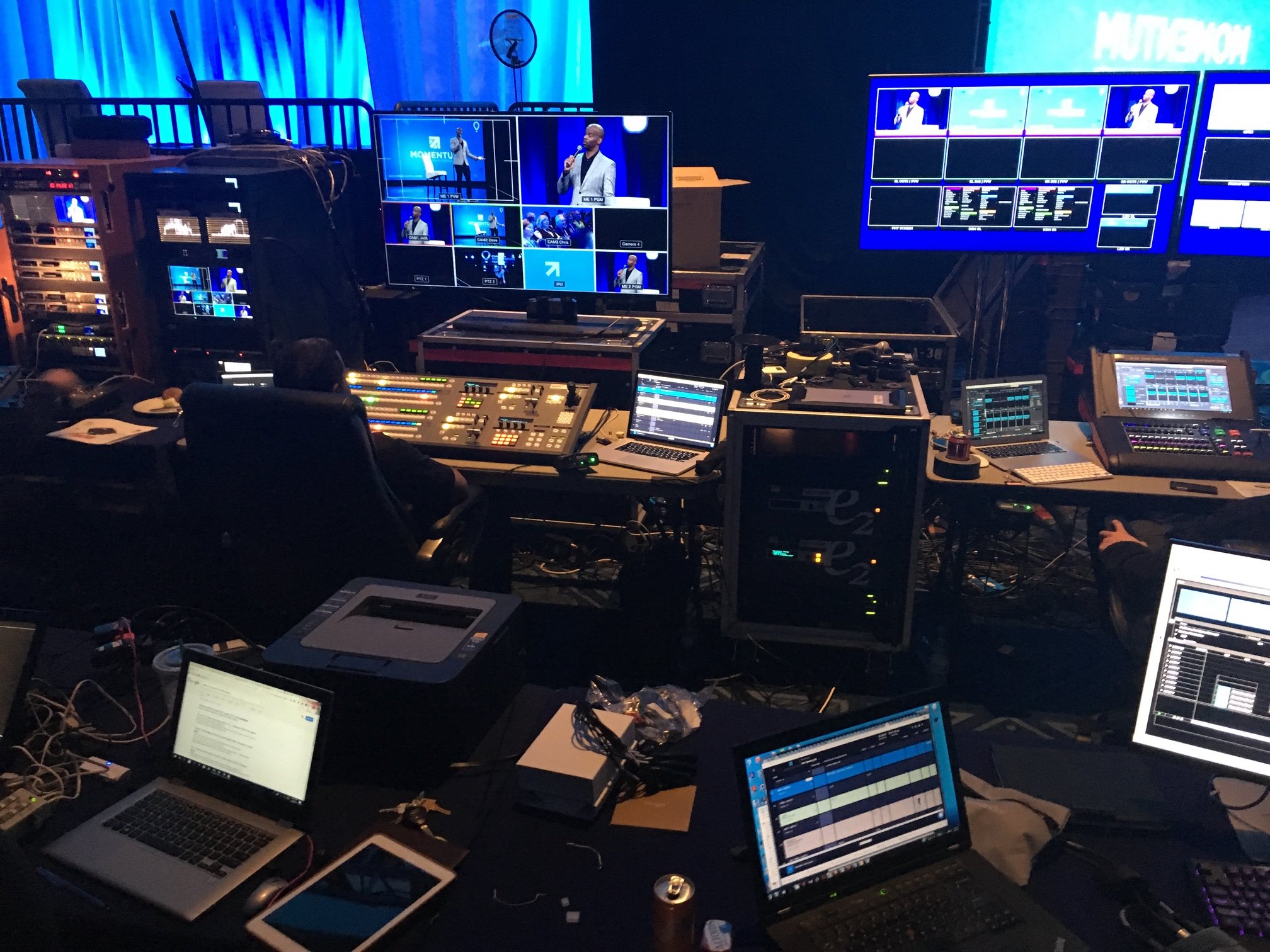Just How Event Production Functions: A Comprehensive Consider the Process
Event production is a complicated and organized process that calls for mindful preparation and execution. It starts with establishing clear purposes and comprehending the target market. Each action, from budgeting to venue option, plays a critical duty in ensuring success. As the process unravels, different elements have to straighten seamlessly. Yet, the subtleties of this detailed operation commonly go undetected. What are the essential stages that contribute to a memorable event?

The Preliminary Drawing Board
When beginning on event production, careful planning is important to guarantee an effective end result. The preliminary preparation phase acts as the foundation for all succeeding initiatives. During this stage, event manufacturers need to specify the event's objective and purposes plainly. Identifying the target market helps customize the experience and messaging, assuring importance and engagement.Producers need to likewise consider the event layout, whether it be in-person, virtual, or crossbreed, as this will certainly affect various logistical aspects. Picking a suitable day and location is vital, as it affects availability and availability.Furthermore, assembling a reputable team is basic for dividing responsibilities and improving interaction. Establishing a timeline with milestones warranties all tasks are finished on routine. This phase entails thorough research, including determining potential difficulties and developing techniques to mitigate threats. Inevitably, a well-structured preliminary planning stage establishes the tone for a successful event production trip.

Budgeting and Source Allocation
In event production, efficient budgeting and resource allocation are crucial for success - event production charlotte. Establishing financial parameters sets the foundation for all subsequent decisions, while source circulation techniques ensure that every element of the event is effectively sustained. With each other, these elements aid maintain control over expenses and maximize using readily available sources
Establishing Financial Parameters
Establishing economic parameters is vital to the success of any type of event production, as it establishes the structure for efficient budgeting and resource appropriation. This process begins with specifying the general budget, which encompasses all aspects of the event, including location expenses, food catering, and advertising. By determining available funds, event planners can prioritize expenses and allocate sources appropriately. On top of that, it is necessary to carry out extensive market research to anticipate prospective expenses and recognize funding resources, such as sponsorships or ticket sales. Developing clear financial criteria additionally help in danger monitoring, enabling planners to set aside backup funds for unanticipated costs. Ultimately, a distinct budget functions as a roadmap, leading the event production team towards attaining their goals while keeping monetary control.
Resource Circulation Strategies
Reliable resource circulation techniques are important for making best use of the effect of an event while sticking to spending plan constraints. Successful event production calls for a precise approach to budgeting and resource allotment. Coordinators should prioritize necessary components such as venue, food catering, and innovation, making certain that funds are allocated to areas that boost attendee experience. A thorough budget needs to detail anticipated expenditures and identify areas for prospective price savings, such as discussing with vendors or discovering sponsorship chances. Additionally, tracking expenses throughout the preparation process helps avoid overspending. By employing strategic resource circulation, event manufacturers can provide a remarkable experience while preserving fiscal responsibility, inevitably adding to the general success of the event.
Venue Selection and Logistics
Choosing the appropriate location is necessary to the success of any type of event, as it sets the phase for the general experience. Location option includes examining numerous aspects, including ability, availability, and place. Coordinators need to consider the target market and the nature of the event, guaranteeing the place aligns with the event's goals.Logistics play a significant duty in this procedure, entailing plans for seats, audiovisual devices, and providing services. An appropriate place must assist in smooth flow for participants and personnel, improving engagement.Additionally, assessing prospective locations for facilities like car parking, restrooms, and emergency situation exits is necessary for security and convenience. The timeline for safeguarding the venue is also essential, as prominent locations may schedule rapidly - event production charlotte. Comprehensive preparation and prompt execution can ultimately contribute to a smooth event experience, making place selection and logistics essential components of effective event production.
Innovative Principle Growth
While the venue sets the physical phase, creative principle development shapes the event's identification and narrative. This process begins with identifying the event's purpose and target audience, enabling event manufacturers to create a compelling motif that reverberates with attendees. Conceptualizing sessions usually include varied point of views, cultivating innovative concepts that align with the event's goals.Once a style is established, visual components such as color combinations, signs, and decoration are developed to boost the total atmosphere. Storytelling techniques might additionally be incorporated to develop an interesting journey for individuals, guaranteeing an unforgettable experience. In addition, factors to consider relating to entertainment, activities, and interactive parts are lined up with the selected idea, enhancing the motif throughout the event.Ultimately, reliable innovative idea growth assurances that every aspect of the event functions cohesively, leaving a long lasting perception on participants and fulfilling the event's goals. This fundamental job lays the groundwork for succeeding preparation and execution phases.
Teaming up With Vendors and Providers
Effective event production depends upon reliable collaboration with suppliers and distributors. view website Choosing reputable partners, discussing agreements effectively, and ensuring prompt distributions are important action in this procedure. Each of these aspects adds considerably to the overall success and smooth implementation of an occasion.
Choosing Reliable Allies
Exactly how can event organizers assure a smooth production experience? Choosing reputable companions is vital in accomplishing this goal. Event planners have to carry out comprehensive study to recognize suppliers and suppliers with a tried and tested record of quality. This consists of inspecting referrals, examining portfolios, and assessing client responses. Planners need to focus on partners that demonstrate professionalism, prompt interaction, and a willingness to team up. Structure strong partnerships promotes count on and makes it possible for quick problem-solving throughout the event. Furthermore, it is useful to pick local vendors that understand the venue and local logistics. Eventually, an effective event depends upon the synergy in between organizers and their partners, ensuring that every element of production runs smoothly and successfully.
Negotiating Contracts Effectively
Efficient arrangement of agreements is an important action in the collaboration in between event planners and their vendors and distributors. This process entails clear interaction of expectations, deliverables, and timelines. Planners must carry out detailed research on market rates and industry standards to establish a baseline for settlements. It is vital to produce a collective ambience, encouraging open dialogue about terms, prices, and possible backups. Coordinators must additionally focus on comprehending the supplier's abilities and restrictions to straighten their requirements efficiently. Versatility can result in equally helpful contracts, promoting long-term partnerships. Crafting distinct contracts that include certain efficiency metrics can assist ensure responsibility, inevitably resulting in effective event implementation and fulfillment for all celebrations entailed.
Making Sure Prompt Distributions
Timely distributions are important for the smooth execution of any event, requiring diligent cooperation between planners and their suppliers and providers. Efficient interaction is crucial, as it aids establish clear expectations pertaining to shipment timetables, quantities, and details demands. Organizers commonly produce in-depth timelines to detail vital landmarks, ensuring all celebrations stay lined up throughout the procedure. Routine check-ins with suppliers can help recognize possible hold-ups early, enabling positive remedies. Additionally, constructing strong relationships with trusted providers fosters depend on and responsibility, which can result in much better service and prioritization. By prioritizing these collaborative initiatives, planners can decrease interruptions, thereby improving the general efficiency of event production and making sure that all necessary materials and solutions arrive as intended.
Marketing and Promotion Approaches
While arranging an event, the success of advertising and promotion strategies can significantly influence participation and involvement. Effective techniques often include a combination of digital marketing, standard marketing, and grassroots outreach. Using social networks systems enables for real-time interaction and targeted advertising, reaching specific demographics effectively. Email marketing campaigns can further involve possible participants with tailored material and reminders.Collaborations with influencers or sector leaders can likewise boost credibility and widen reach. Developing interesting content, such as videos or blog sites, helps to generate buzz and sustain interest leading up to the event. In addition, leveraging early-bird price cuts and special perks can incentivize redirected here ticket purchases.Promoting through typical channels, such as posters or regional media, stays relevant, especially in community-focused occasions. A comprehensive method that integrates numerous strategies warranties optimum presence and engagement, ultimately adding to the event's success and the creation of a remarkable experience for guests.
On-Site Execution and Monitoring
On-site implementation and administration are crucial components that establish the overall success of an event. Reliable sychronisation during the event ensures that all aspects line up with the planned program. Event managers look after logistics, including vendor sychronisation, equipment configuration, and visitor solutions. Checking timelines and addressing any unanticipated concerns are essential for maintaining a smooth experience.The team plays a considerable role, as qualified workers are accountable for various jobs such as registration, information circulation, and technological assistance. Interaction amongst employee is critical; it promotes a collective atmosphere and makes it possible for quick resolution of challenges.Additionally, safety procedures have to be followed, securing the well-being of all guests. Post-event examinations are also part of on-site administration, providing understandings for future improvements. other By concentrating on these aspects, event producers can produce memorable experiences that satisfy or exceed attendee expectations while accomplishing the event's objectives.
Regularly Asked Concerns
Just how Do I Choose the Right Event Motif?
Choosing the appropriate event motif includes considering the target market, event purpose, and location. Researching existing trends and gathering input from stakeholders can additionally inspire imaginative concepts that resonate and create a remarkable experience.

What Are Usual Mistakes in Event Production?
Common blunders in event production frequently include poor planning, inadequate interaction among staff member, budget plan mismanagement, overlooking to consider the audience's requirements, and falling short to perform a comprehensive post-event evaluation for future improvements.
How Can I Measure Event Success?
To determine event success, one can evaluate participant contentment, involvement levels, budget adherence, and post-event responses. Trick efficiency indications, such as ticket sales and social media communications, likewise supply important insights into total effectiveness.
What Should I Do if It Moistens the Event Day?
In case of rainfall on the day, the organizer ought to execute backup plans, such as safeguarding outdoors tents or moving tasks inside. Interaction with participants regarding modifications is vital to ensure a smooth experience in spite of weather difficulties.
Exactly How Can I Guarantee Participant Engagement Throughout the Event?
